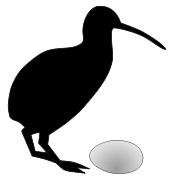aubio
Save the kiwis
A few months ago, Lukasz Tracewski explained his project on the aubio-user mailing list. Using aubio's onset detection from his custom Python code, he is able to process very large amounts of recordings from New Zealand wilderness to monitor the populations of kiwis and improve their protection.

A kiwi and its egg, by Shyamal (own work), CC-BY-3.0, via Wikimedia Commons
Here is how Lukasz describes the challenge:
The project is to support efforts in kiwi protection, famous flightless bird from New Zealand. We count their calls (and also determine gender) in each file and use this information to understand ecosystem health and how well protection efforts are working.
As you can imagine finding that there is something worth interest in a recording is crucial: if there are too many false positives, then noise reduction by spectral subtraction becomes inefficient. The other way risk is even greater: if bird call goes undetected, then it will be included in noise-only regions and then subtracted from a whole sample, effectively eliminating many possible candidates.
Processing time becomes important when there are truly many sample. As mentioned before, there are 10000 hours of recordings. To get them identified we will probably buy time on Amazon Web Services EC2 compute-optimized instance (something with 32 virtual CPUs). Time is money in this case, so keeping it short is crucial.
Interestingly, Lukasz found that the energy onset detection method, which
often generates a lot of false positives on music signals, was, in his case,
the one giving the best result for the detection of bird calls.
Find out more about Lukasz project on the Ornithokrites web page.
Sat, 29 Nov 2014, 23:46. trackback - view/add comments
Responses to this post
Leave your own comment
© 2003-2017 the aubio team | cc-by-sa